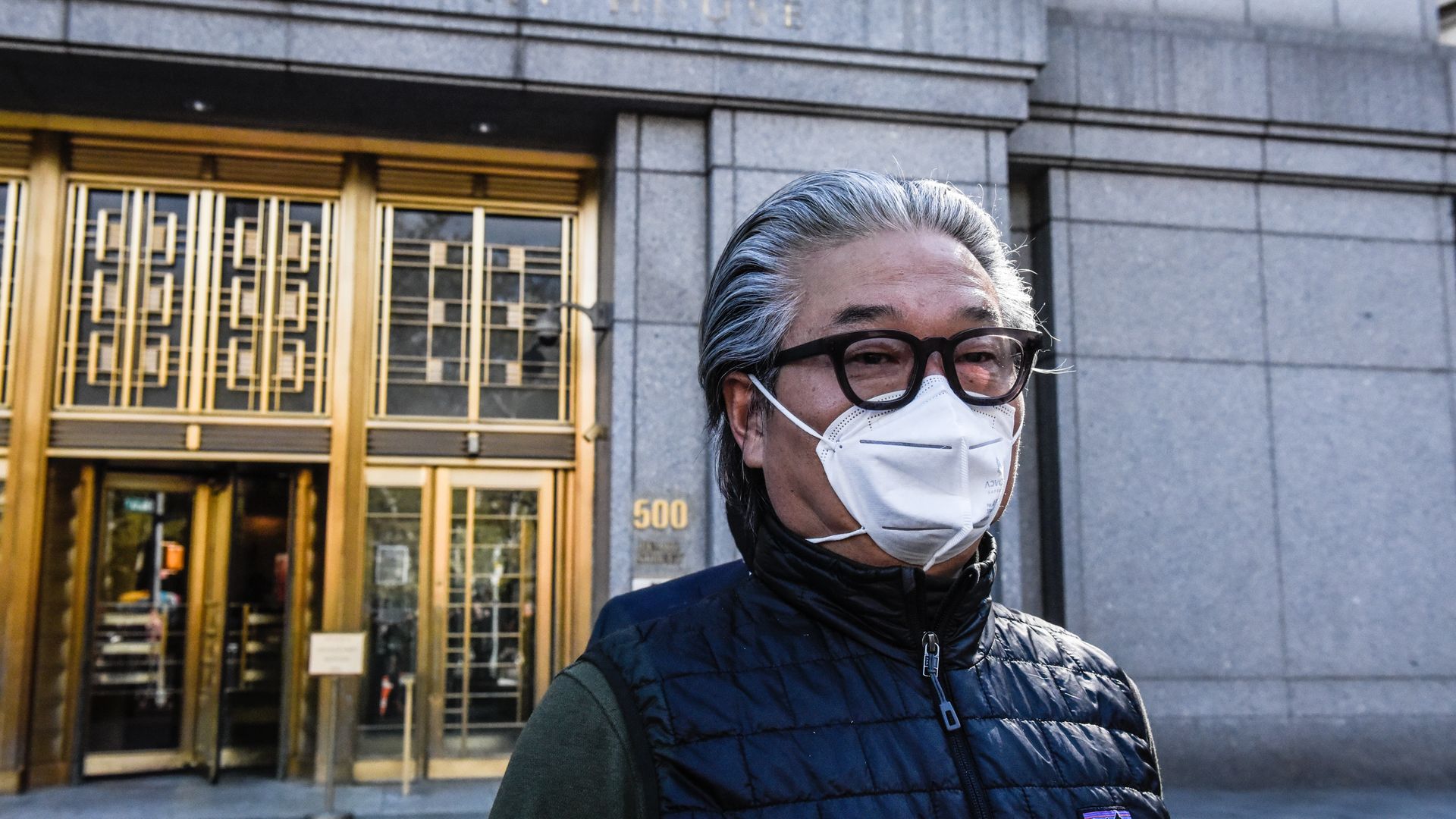Here's what Bill Hwang's indictment says
Add Axios as your preferred source to
see more of our stories on Google.

Bill Hwang departs federal court in New York on Wednesday, April 27, 2022. Photo: Stephanie Keith/Getty Images
Bill Hwang's indictment on Wednesday alleges a remarkably simple route to defrauding some of the world's most sophisticated financial institutions. It says he and his family office, Archegos, simply lied to them.
Driving the news: In a criminal indictment and a civil complaint, Federal authorities said that Hwang and his associates used Archegos as "an instrument of market manipulation and fraud" — and offered new details on how, they allege, the firm fraudulently convinced major Wall Street banks to extend Archegos billions of dollars worth of credit.
Why it matters: If you're trying to understand how Wall Street works, never let an epic screw-up go to waste. When something goes wrong, and, even better, criminal indictments arrive — that's when you get to see how things actually work.
- As screw-ups go, the March 2021 implosion of the hedge fund-like Archegos was one for the ages, eventually costing banks like Morgan Stanley, Nomura and Credit Suisse billions of dollars.
The government alleges Hwang and a former lieutenant (who were arrested Wednesday) manipulated prices in publicly traded stocks by using a network of major brokerage firms and an ungodly amount of borrowed money.
The other side: "Bill Hwang is entirely innocent of any wrongdoing; there is no evidence whatsoever that he committed any kind of crime, let alone the overblown allegations that pervade this indictment," according to a statement from Hwang's attorney Lawrence S. Lustberg of Gibbons P.C.
The intrigue: What Hwang allegedly did isn't really supposed to be possible, at least not without people knowing. Whenever investors acquire a significantly large chunk of shares in a publicly traded company — the threshold is 5% — they have to disclose it to the public.
- Yes, but: Hwang didn't always buy shares of stock. Instead, he was often buying a product from a bank, called an equity "swap," which is a contract with payouts tied to stock movements. When you buy such a swap, you get the benefits of owning a stock — the exposure to its movements — without having to really own it.
- That's not illegal. Selling swaps is a thriving business on Wall Street, and many who buy them appreciate anonymity and avoiding reporting requirements. (The stock ownership disclosure requirements don't currently apply to swaps — but the SEC has proposed changing that.)
So what's the problem? Well, as I read it, it essentially comes down to lying.
- After a while, the banks that sold the swaps to Hwang — and extended him large amounts of credit — began to notice he was making some remarkably large bets. This generated loads of fees for them — but also put them at risk. If Hwang’s bets went against him, he could wind up owing them large amounts of money he didn’t have.
The banks started asking questions along the lines of "By the way are these the only crazy bets you're making? You're not doing this with anybody else... right??"
- The government alleges that throughout 2020 and into 2021 Archegos' responses to such questions were often "deceptive, false and misleading." Court papers cite a number of examples of Archegos' people telling the banks things that prosecutors say were untrue.
- Such statements, the government says, amount to violations of anti-fraud provisions of securities and commodities trading laws.
The bottom line: I'm not a lawyer and have no idea how this case will play — or plead — out. But it's interesting to see the banks portrayed as the victims in the saga, especially since several of them saw red flags around Archegos that made them nervous — but they stuck with him all the way down.
- It's hard to say why, but I'll bet the fees they pocketed from the massive amounts of business he did on Wall Street likely had something to do with it.
